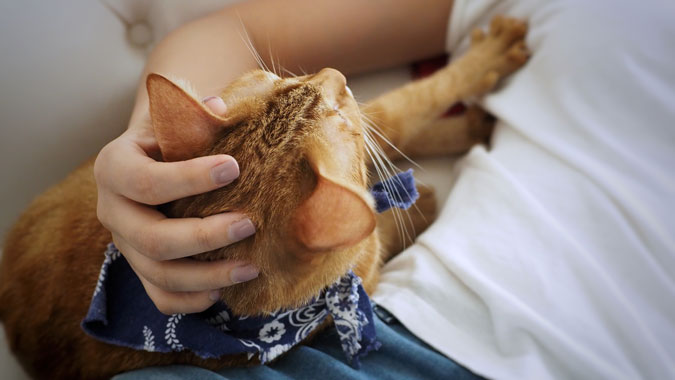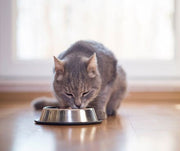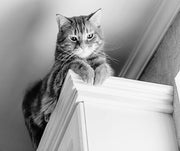Why Do Cats Purr?

What's more cozy that having a purring kitten cuddle up next to you? Purring seems to be the most obvious sign that your cat is content, but what causes it? Why and how exactly do cats purr? If this is something you've ever wondered about your feline friend, read on!
WHAT IS PURRRING, EXACTLY?
Before we can understand why our cats purr, it is important to know exactly what purring truly is. Purring is essentially the relaxing of a cat's vocal cord muscles. When a cat finds a sense of relaxation, the muscles surrounding their vocal cords vibrate as they inhale and exhale.
CONTENTMENT
Cats are smart creatures and have learned from humans that they gain more attention when they purr. A cat normally purrs when they are sitting on their owner's lap, soaking in all the love. Petting and enjoying time with your cat often triggers this reaction.
COPING MECHANISM
When you are feeling down or are dealing with pain, whether physical, mental, or otherwise, do you have something you do that helps you cope? The answer is likely yes. As humans, we have a number of ways we deal with pain or being uncomfortable. For example, some people hum or sing to help them cope with stress. This is what cats do as well. Scientists have also deduced that various frequencies associated with purring help to steady breathing, reduce pain, and even build muscles. A laboring cat will sometimes purr in the midst of some of their worst pain.
CALMING DOWN
Sometimes, cats will purr at some of the oddest times. Shelter owners report cats purring without anyone else around. Veterinarians often see cats purring on examination tables when they are obviously frightened. Purring is also a way for cats to deal with an uncomfortable situation. Cats get nervous when they are out of their normal routine, which is why they might start purring in stressful situations. This coping mechanism is very similar to anxiety-related behaviors. For example, some people may have nervous tics such as tapping their fingers or jiggling their leg up and down when stressed. Purring can often serve as the same solution for cats, and some studies suggest that purring may even have healing properties.

GUIDING THEIR KITTENS
Lastly, and instinctually, purring helps newborn kittens get to know their mother. Kittens are born blind and deaf, but the reverberations from purring allows the kittens to find their mother, who uses purrs as a directional reference or a call for her babies, making it easier for them to follow or locate her. Mother cats often use purring as a sort of "lullaby" for their newborn litter.
CONCLUSION
If your cat is alone, seemingly unharmed, and purring, they might be perfectly content, but sometimes their purring could the result of pain or anxiety. Ensure that you understand your cat's anxiety levels and you'll likely be able to tell whether your cat is purring with content or stress. Cats are remarkably like humans with their emotions, so it is important that pay attention to your cat's body language and purrs.
Previous article

Next article

Related posts
View all-

What Can You Use Instead of Cat Litter?
Traditional cat litter is convenient, but it’s not the only option. Many cat owners look for alternatives to reduce waste, save money, or avoid chemicals found in clay-based kitty litter. Some options offer better odor control, while others are more eco-friendly or gentler on a cat’s paws.
Read Article -

How to Keep My Backyard Smelling Fresh
A clean backyard should smell fresh, unlike pet waste, smoke, or mold. Bad smells can linger, especially when dog poop, urine, or food scraps attract flies and bacteria. If your yard has a foul odor, it's time to take action. The first step is cleaning up pet feces, trash, or rotting food. A garden hose can wash away dirt and urine from artificial turf, patios, and decks. To neutralize odor, Use baking soda, white vinegar, and essential oils.
Read Article -

What Supplies Do First-Time Cat Owners Need?
Bringing home a new cat is exciting, but making them feel safe and comfortable takes more than love. First-time cat owners must prepare with the right supplies to ensure a smooth transition. From a litter box to cat food and a warm bed, having the basics ready can help your new kitty settle in faster. This guide covers everything a new cat owner needs to make their new pet feel at home.
Read Article



